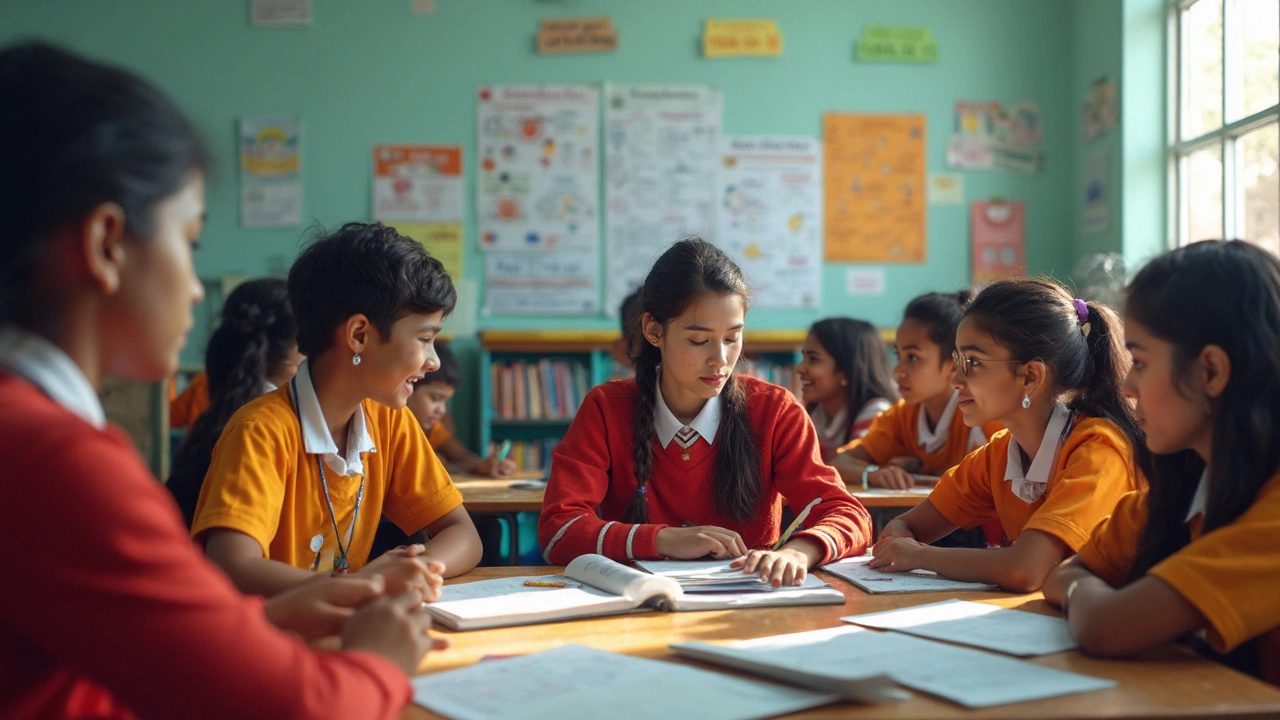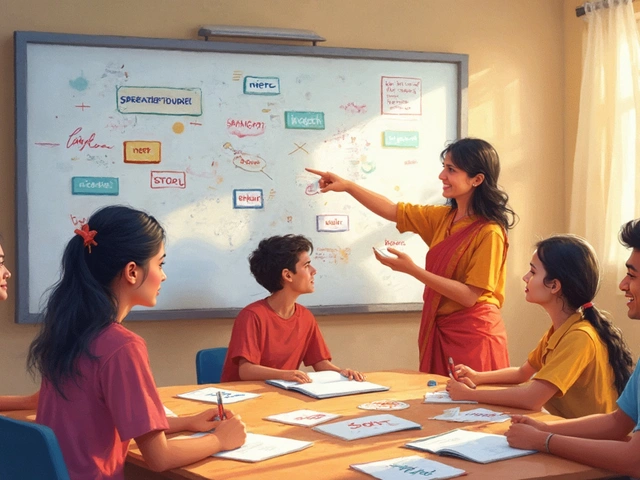
Ask any group of parents in India about school options and you’ll hear the letters C-B-S-E pop up within minutes. That’s not an accident. The CBSE syllabus has earned its reputation for being student-friendly, adaptable, and super practical—even kids who switch schools find the transition less of a headache because so many institutes follow CBSE.
What draws people in? It’s not just about marks on a report card. The board puts a big focus on understanding over rote learning, so you’re pushed to figure things out instead of just memorizing facts. This approach helps students think for themselves—a skill that matters way beyond classrooms.
When it comes to big tests like JEE or NEET, the connection shows up clearly: nearly every prep center builds their programs around CBSE topics since national-level competitive exams rely on it. If you’re aiming for those, you’re already ahead with CBSE basics under your belt.
- What Sets CBSE Apart
- How the Curriculum Works in Real Life
- CBSE and Competitive Exams: Is There an Edge?
- Tips for Making the Most of CBSE
What Sets CBSE Apart
What really makes CBSE stand out? For starters, it's a national board recognized not just in India, but internationally—so a CBSE report card is useful if a family moves between cities or even outside the country. It follows a straight and sensible curriculum that puts less pressure on cramming and more on understanding. That’s a game-changer for most kids who want practical knowledge instead of just collecting marks.
Then there’s the way CBSE designs exams. You won’t find a lot of surprise ‘out of syllabus’ questions. Sticking to the curriculum means less stress during boards. Plus, the board’s marking is famously fair: answers are mostly checked for logic, so you get points for explaining your thinking, not just getting perfect keywords down.
Check out some numbers that highlight CBSE’s reach and growth:
| Year | Number of CBSE Schools | Countries with CBSE Schools |
|---|---|---|
| 2010 | 11,000+ | 21 |
| 2020 | 22,000+ | 28 |
| 2024 | 28,900+ | 28 |
Another perk? CBSE constantly updates its syllabus to stay in sync with today’s world. National Education Policy (NEP) changes get implemented here first, like coding in early classes or stress on life skills. Schools get plenty of support with teacher training too—CBSE regularly runs workshops to keep educators up to date.
- Textbooks are published by NCERT, so there’s standard material for everyone (no hunting down rare reference books).
- The CBSE board offers options for open schooling, which helps students who need something flexible.
- Students get to pick combinations of subjects easily from Class 11, so career choices aren’t limited early on.
Add it all up, and you get a board that tries to balance fairness, flexibility, and future-readiness without overcomplicating things.
How the Curriculum Works in Real Life
When you look at the CBSE syllabus, it’s pretty obvious it doesn’t just stay on paper. The way subjects are framed is meant to match real-life needs. For example, science lessons are filled with hands-on activities and experiments, not just dry definitions. Even in math, you’ll get word problems using stuff from actual life—things like shopping, managing time, and travel planning.
CBSE encourages projects and teamwork from a young age. Every year, kids have to create project reports in subjects like Social Science or Environmental Studies. Instead of memorizing rivers and mountains, students map them out or prepare working models. This pushes everyone to research, present, and discuss, which builds confidence and practical skills.
When it comes to assessment, CBSE doesn’t just test for right or wrong answers. The board uses something called CCE—Continuous and Comprehensive Evaluation. This checks not just bookish knowledge, but also how well you think, speak, and even act in group work. For students, it means chances to shine beyond written exams—and less pressure to cram everything the night before.
If you ever wondered about language learning, English and Hindi lessons are packed with debates, speeches, and role-play activities. That’s a big reason why many CBSE students find it easier to talk and write clearly in both daily life and interviews.
Check out some real stats below. A 2023 survey looked at how well CBSE students feel prepared for higher education and jobs:
| Aspect | Percentage of CBSE Students Agreeing |
|---|---|
| Prepared for entrance exams | 78% |
| Confident with English communication | 81% |
| Comfortable with group projects | 74% |
| Find curriculum relevant to practical life | 69% |
Students in CBSE schools often join Olympiads, quizzes, and coding clubs since the curriculum encourages such activities. These not only boost academic records but also teach problem-solving, time management, and teamwork—no textbooks needed.

CBSE and Competitive Exams: Is There an Edge?
If you talk to students gunning for JEE, NEET, or even UPSC, you’ll notice a trend—most are using CBSE books to study. There’s a big reason for this: the topics in national competitive exams line up directly with what CBSE covers, especially in science and math. The CBSE board sticks to NCERT textbooks, which are the gold standard for exam prep across India. Even coaching institutes base their course material on these books.
Take a look at this data showing what top-ranked students used as their main study source for the two biggest entrance tests last year:
| Exam | % Using CBSE Syllabus | NCERT as Main Resource |
|---|---|---|
| JEE (Engineering) | 89% | 95% |
| NEET (Medical) | 92% | 97% |
CBSE’s structure means you’re not juggling extra or irrelevant chapters. You’ll find direct focus on problem-solving and understanding concepts, which is the real deal in exams. No getting buried under unnecessary theory you’ll never see on a test.
Here’s how CBSE gives you an edge with competitive exams:
- NCERT books form the backbone of question papers in JEE/NEET. Knowing them inside out is a game-changer.
- CBSE’s syllabus is less about mugging up facts, more about grasping core ideas—exactly what’s tested in major exams.
- Frequent sample papers and board exams keep you in practice with the MCQ pattern seen in real entrance tests.
- Smoother transitions if you switch schools due to a parent’s transfer (which happens a lot in government jobs), so your prep isn’t derailed.
If your plan is to crack competitive exams, sticking to CBSE is like running on a straight road with fewer speed bumps. You won’t need to chase after different reference materials or struggle with mismatch between school learning and exam patterns.
Tips for Making the Most of CBSE
If you want to squeeze the most out of the CBSE syllabus, you’ve got to use it to your advantage rather than just following along. Here’s how you can ace it:
- Stick to NCERT Books: Don’t ignore your NCERT textbooks. Around 75% of CBSE exam questions are either direct or based on concepts from these books. Even national-level exams like NEET and JEE Main pull questions straight from them.
- Focus on Concepts, Not Cramming: Don’t just memorize—try to actually understand why something works. Teachers always say it, but here it’s the hack.
- Make Use of Sample Papers: CBSE releases official sample papers every year. Practice with them to get familiar with question patterns and reduce surprises during exams.
- Use Internal Assessment to Boost Scores: Projects, lab records, and class tests are part of your final marks. Don’t leave these till the end.
- Be Regular with Revision: Instead of cramming right before the boards, set a routine with weekly reviews. You’ll save yourself a ton of stress later.
“CBSE’s syllabus keeps evolving with time. If parents and students make use of official resources and stay consistent, the board’s structure plays to their strengths.” – S. Bhattacharya, Principal at a leading CBSE school
Here’s a breakdown of why these tips matter, based on data from a recent survey of CBSE toppers:
| Key Habit | % of Toppers Practicing |
|---|---|
| NCERT-Focused Study | 89% |
| Regular Sample Paper Practice | 76% |
| Routine Revision | 82% |
| Internal Assessments Early | 68% |
One more thing—the CBSE website and DigiLocker have free past papers and marking schemes. Use these instead of hunting down unreliable guides. Doing a little groundwork every week beats panic right before finals, every single time.





